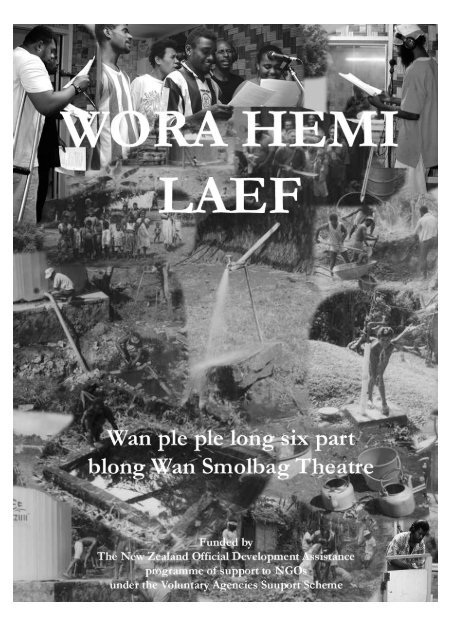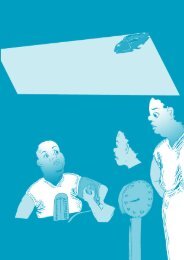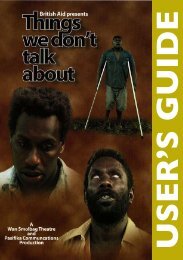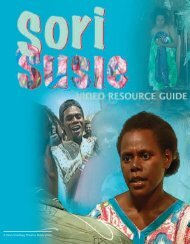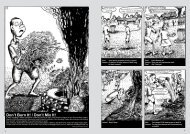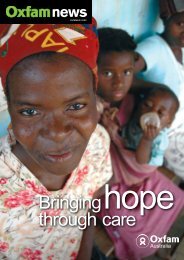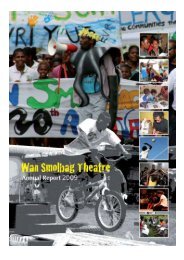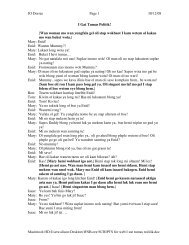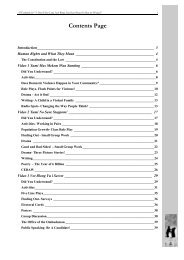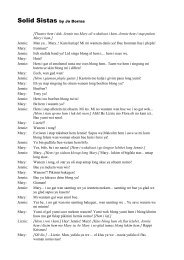You also want an ePaper? Increase the reach of your titles
YUMPU automatically turns print PDFs into web optimized ePapers that Google loves.
<strong>Wora</strong> <strong>Hemi</strong> <strong>Laef</strong>- A Work Book 1
Table of ContentsIntroduction Page 5Episode 1 Page 6Episode 2 Page 10Episode 3 Page 18Episode 4 Page 22Episode 5 Page 25Episode 6 Page 29Information Section Page 33<strong>Wora</strong> <strong>Hemi</strong> <strong>Laef</strong>- A Work Book 3
4 <strong>Wora</strong> <strong>Hemi</strong> <strong>Laef</strong> - A Work Book
Introduction<strong>Wora</strong> <strong>Hemi</strong> <strong>Laef</strong> is a six part radio serial written andproduced by <strong>Wan</strong> <strong>Smolbag</strong> <strong>Theatre</strong>. The serial went outon Radio Vanuatu in 2000. It was commissioned by theDepartment of Minerals and Water Affairs. The aim of theradio serial is:• to show people in villages the kind of problemscommunities face through lack of clean water• problems they have trying to get a water supply• the length of time people must wait before they canexpect to get a water supply• responsibilities of communities to collect money forrepair and maintenance and to do these thingsThese are all issues a community should consider beforethey have a water supply installed. This booklet introducesstudents to these issues and gives them a chance to thinkabout how their own villages could procure and maintain awater system.The radio serial is recorded in Bislama and the workbook is available in English. The bookgives students the opportunity to translate from Bislama into the English language.The story revolves around a village that has no water supply and their struggle to get thesupply in place. Their problems don’t end there either!This workbook has questions to help groups think about the issues raised in the series andactivities to encourage writing for radio. The workbook is divided into six parts so that theclass listens to one 15-minute tape at a time and then answers questions and has achance to do activities on the issues raised in each programme. Information about theseissues is also provided in the booklet.The workbook tries to encourage the use of small group work. Often when a whole classworks together very few people speak or participate. In a small group nearly everyone getsthe chance to participate!Running Small Group DiscussionsDivide your class into small groups of three to six people and ask them to go through thequestions for each episode. These questions are to check if people are following the storyand to raise discussion of the issues. In small groups everyone must give an oral answerto the questions they choose.You can ask for written answers after a discussion has taken place if you want to checkeveryone's work.You do not need to make your group answer all the questions. You may want to use onlyone question from each episode or make up your own questions. Likewise, you canchoose which activities you will use.<strong>Wora</strong> <strong>Hemi</strong> <strong>Laef</strong>- A Work Book 5
Episode 1Using WaterThe Story and the Workbook!This story is told in six parts. The story follows the life of a group of people who all live inthe same village, and the work of the Department of Minerals and Water Affairs. Theserial looks at how hard it is to get a water system in place and then all the problems thatcan make it difficult to maintain a water system; as well as how these problems might beresolved.Each section of the workbook asks you to listen carefully to the story and answer a fewquestions while you are listening.There are questions for discussion in small groups and some activities to help you lookmore closely at the information.1. Pre-Listening Exercise; Episode 1Before you listen, read these questions and as you listen, try to answer thequestions:i. How many characters can you name?ii. What sounds did you hear in the episode?iii. How many different places (settings) are there in this episode?2. Small Group Discussion - Did You Understand?i. "Mifala I askem yu blong tink tink stronglong ol hopes blong mifala long vilij ia. Olman long vilij ia oli nidim klin wora blongtrink. Oli nidim wora blong stap strong mohelty. Olsem we yu save, wora hemilaef…Tankyu blong ol help blong yu, JifJimmy…"Translate this passage into English. Thepassage tells us that water is life. Do youthink this is true? Why?ii. Why were the women washing so far fromthe village?iii. Why is Leinasei sad when she thinksabout the past?iv. Who was Laisa and why was she sothirsty?v. Who is Jean and why does he want Eileen to go to the river?6 <strong>Wora</strong> <strong>Hemi</strong> <strong>Laef</strong> - A Work Book
vi. Why are all the women so happy at the end of the episode?3. Reading and UnderstandingLeinasei: Mi remeba wan taem…. Taem we spring ia I bin tri..Eileen: <strong>Wan</strong>em i bin happen Leinasei?Leinasei: Mi bin mared wan o tu yia nomo. Afta taem blong kol kol i bin kam mo renino bin foldaon nating. Ples i bin trae we i trae. Ol gras i bin braon olsemwe man i bin bonem. Mo wora long spring ia i nomo kat. Ol woman i binwokabaot evridei blong karem wora blong drink i kam daon long vilij ia….Eileen: Afta?Leinasei: Plante pikanini long vilij ia i bin kasem sik ia, beliron. Smol gel blong mi,Rachel, hem tu i kasem.Eileen: [To Wendy.] Smol gel blong hem we i ded.Wendy: Yes….Leinasei: <strong>Hemi</strong> bin kasem beliron. <strong>Hemi</strong> bin kam bun bun we. Mi bin traem blongmekem hemi kaikai. Be hemi no wandem. Mi bin traem bes blong mi.. be..Papa god i bin karem hem i ko long haos blong hem.Wendy: Sori Leinasei.Read this section from the radio serial out loud in groups of three. It does not matterif boys read the women’s parts.4. Small Group Discussioni. What happened to Leinasei’s daughter, Rachel?ii. Why do you think it happened?5. Discussion and MimeFind as many everyday activities as possible that involve using water.In small groups discuss what you do with water everyday. What would be hard todo if you had no water in the near vicinity? The aim for each group is to think of asmany activities as possible!• Give each group ten minutes to name all the activities they can think of usingwater.• Each group, in turn, mimes their activities to the other groups. This means theymust act out each activity without using words to show the others.• There should be a short break between each action for the other groups to guesswhat the activity is.• The group that has thought of the most activities wins.<strong>Wora</strong> <strong>Hemi</strong> <strong>Laef</strong>- A Work Book 7
6. Story WritingWrite a story about a village that has no water supply.Imagine you live in a village where the nearest water supply is an hour’s walk away.Start your story in the early morning. Describe the village. What are the womendoing? What are the children doing? What are the men doing?Describe who collects water, from where and how.Describe what the dishwashing water looks like after breakfast, after lunch and afterthe last meal of the day.Describe any problems the children have because of the lack of water.Do people get sick? What kind of sicknesses do they have?You could end your story with the community deciding to try to get a water supply.Containers used to collect water from a water source within a village.8 <strong>Wora</strong> <strong>Hemi</strong> <strong>Laef</strong> - A Work Book
7. Poem WritingWrite a poem about a village that has no water supply.Writing a poem is different from a story. A poem is written in short lines, and thewords have a rhythm. Your poem should focus on how important water is inpeople’s lives.Here is an example.WaterWe use itTo wash our hands every dayIt runs between our fingersTaking the dirt and germs awayLeaving our hands cleanTo eat our foodTo shake hands with friendsTo put in the baby’s mouth!WaterWe needWater to drink everydayIt runs down our throatTaking the dust and thirst awayLeaving us refreshedAnd ready for the day’s workAnd the night’s sleepWaterSparkling in pools!Running through pipesRushing out of taps!Fresh, clean water![Main idea - content of stanza orsection]Water cleansWe need water to drinkImages of water as activeand movingWrite your own poem. You can use thisidea, giving your poem three separatesections: You may want to include ideas onhow we use water, why we need it, andimages of what it is.Water being used to clean a young boy ina village.<strong>Wora</strong> <strong>Hemi</strong> <strong>Laef</strong>- A Work Book 9
Episode 2The Story so FarThe village has no water supply. The chief writes a letter to the provincial governmentasking for a water supply. The weather has been very dry and the women have to go along way to wash clothes. Leinasei, the chief's wife, wants a water supply very much. Shestill thinks about the death of her child many years ago, because of the lack of clean water.In town we meet the officers of the Rural Water Supply Department. They explain that theycannot assist all the villages that need a supply, because they do not have enough moneyto put in all the supplies.The women who are washing at the river have to go back to the village to cook for Eileen'sbrother's marriage. Eileen is not happy because she feels her brother does nothing for thefamily and only thinks about himself.A truck comes from the Rural Water Supply Department to the village. All the women arevery excited because they think that they will get a water supply at last!8. Pre-Listening Exercise; Episode 2Before you listen, read these questions and as you listen, try to answer thequestions:i. What sound effects can you hear?ii. How many different locations are there?iii. Try and list all the different things that Neil tells the villagers they need to do tomaintain the system once it is in place.9. Small Group Discussion - Did You Understand?i. Neil says that he has not come to give the village water. What has he come todo?ii.Pierre says: "Yu save problem we i happen long junior secondary skul longprovincial headquarter? Landowner i bin letem olgeta i usum wora blong fidimsaplae blong skul. Afta, taem we skul i stat, hemi bin askem wan bik bikfalamoni blong wora ia. Mo taem we oli bin talem se oli no save paem moni ia, hemibin kat katem pipe blong wora."What do you think about landowners who do this kind of thing? Explain why youthink as you do.iii. The village has to have a water committee. Why is this?iv. One of the jobs a water committee does is to collect money. What is the moneyfor?10 <strong>Wora</strong> <strong>Hemi</strong> <strong>Laef</strong> - A Work Book
v. Who is the landowner of the area where the water source is?vi. Who wants a water supply most in the village, the men or the women? Explainwhy.10. Reading AloudIn groups of five, read the scene below out loud. Girls or boys can read any of theparts.You can translate this short scene into English and then read it out. You shouldstart with everyone talking and the chief will stop them!Jif: Bae yumi stat nao ia. [Ol vois oli ko kwaet.] Neil hemi kam long Dipatmenblong Rural <strong>Wora</strong> Saplae blong mekem wan plan blong wan wora saplae wei save kivim wora long yumi evriwan long vilij ia…[<strong>Wan</strong> man i wisel.]Henry: Bae yumi evriwan i kat tap long haos?Neil: Ummmm.. i no olsem fren blong mi. Bae evri haos ino save kat tap. I savekat wan tap blong evri twenty man…Jean: 20 man? Yu minim se mifala i mus sarem ol tap? From wanem nao i olsem?Neil: From moni. Ino kat enaf moni blong putum wan wan tap long evri haos longvilij. Mifala i stap putum ol saplae we i save mekem laef long ol man long vilijia i mo esi. Be ino posibol blong putum wan wan tap long evri haos…Pierre: I klia, ah…Neil. Be mi kat wan kwesjen.. wora blong fidim saplae ia bae i kamwea?Jif: <strong>Wora</strong> hemi wan bikfala problem long vilij ia. Ino kat tumas wora raon longples ia. I kat riva antap we ol woman oli was long hem..Henry: Riva ia i kud! Ino save drae. Iven long taem blong bik bikfala sun i stap ronnomo.Neil: <strong>Hemi</strong> rali importan se yumi faenem wan kudfala wora blong fidim saplae ia.Mi hop se tumoro yumi save ko luk luk raon mo faenem wan wora we i enafblong fidim saplae ia.Pierre: I oraet nomo. Yumi evriwan i wandem kat wora long vilij ia…Henry: Yumi evriwan.Ol: <strong>Wora</strong>! <strong>Wan</strong> samting we yumi evriwan i nidim! <strong>Wora</strong> hemi laef ia!11. Small Group Discussioni. Why is it not possible for every house to have its own tap?ii. What does Neil want to find and why?<strong>Wora</strong> <strong>Hemi</strong> <strong>Laef</strong>- A Work Book 11
12. Make a Sound Story!Sound stories only use sounds. The sounds can be made with objects of any kind:stones, pieces of wood, water in a dish or a bucket or the human voice. The soundstories can include laughter, screams, yawns and cries, but no clear words. Thesesound stories will help you think about sound and the need for sound effects andsound "pictures" when we listen to the radio.What You Need• Copies of the stories below• Tables or desks to hide behind• Buckets, dishes, pieces of wood for making noises• The support of other teachers!What To Do• Divide your class into groups of five or six.• Give out one of the stories to each group if possible. [Suggested stories below.]If there are more than seven groups, more than one group can do the samestory.• They should practice behind a turned up desk or table.• They will need fifteen to thirty minutes to practice their story and work out how dosound effects (eg. rain = fingers drumming on wood).• One member of the group should be the director and sit outside and listen to thesounds the group is making, to check the sounds are loud enough – make theright sound picture – the story is clear and can be understood.• The groups should perform their sound story for the whole class who must thenretell what happened in English or Bislama.Gather together things you think will be useful to make your soundstory and then discuss the story with your group.12 <strong>Wora</strong> <strong>Hemi</strong> <strong>Laef</strong> - A Work Book
Suggested StoriesA Day at the BeachA truck pulls up and beeps. People rush out of a house shouting and banging thedoor. They jump into the truck. The truck starts and they all cheer. The truck drivesalong. A dog runs barking at the truck and the truck swerves. Everyone screams.The truck drives on. The truck stops. The sound of the sea is heard. Everyonejumps out and starts to play volley. It starts to rain. Everyone is unhappy. The raingets harder and harder. Everyone runs to the track. It drives off.Running Away at NightEveryone in the house is fast asleep. We hear them snoring. Some one gets upvery quietly. They walk quietly across the room and then open the door. The doorcreaks. They stop. They open the door again slowly. They sigh with relief. Theywalk to the front door. They try to open it, but it is locked. They walk back and pickup a key. They walk to the door. They drop the key. Someone starts to wake up.The key is picked up. The door opens and closes with a bang. A dog starts to barkoutside. People are heard shouting.These children are drumming their fingers on aluminum pots and plasticbuckets, as well as the floor to make rain noises. There is also someoneusing the water to make the scene sound "wet"!<strong>Wora</strong> <strong>Hemi</strong> <strong>Laef</strong>- A Work Book 13
The HurricanePeople are hammering nails in the roof and sawing down branches of trees. It startsto rain. People shout and bang on the door. The door opens. People run inside.The door shuts. Some one switches on a radio. It crackles. Someone hits the radio.It crackles some more. We hear the wind blow. It starts to get stronger. The raingets even stronger. Something falls over. Someone screams. Slowly the windstarts to die down. The rain gets less and less. All the noise stops. The door opens.People come out. We hear they are shocked and surprised.Doors opening and closing are just some of the sound effects <strong>Wan</strong><strong>Smolbag</strong> used in the <strong>Wora</strong> <strong>Hemi</strong> <strong>Laef</strong> series.Chasing Wild Pigs in the BushBirds are singing in the bush. People are walking through the bush with dogs. Asound of dogs sniffing. The dogs run off through the bush. The sound of peopleshouting and running after the dogs. One of them is out of breath. Everyone stopsand breathes heavily. Sound of dogs barking in the distance. Everyone runs offagain. Sound of a wild pig running through the bush. Someone screams. Sound of agun. The pig screams and then dies. The dogs are heard barking, closer.14 <strong>Wora</strong> <strong>Hemi</strong> <strong>Laef</strong> - A Work Book
A Custom DanceA group of people are practicing a custom dance. First we hear the sound of thetam tam and then the sound of people’s feet. They start but the feet are not inrhythm with the drum. Someone shouts. The drumming stops and everyone startsto shout. They go quiet and then the drumming starts again. This time the feet are inrhythm with the drumming. The dance goes on to the end and then everyone clapsand shouts and slaps each other on the back.The Night WalkTwo people are walking along at night. A dog barks. One of them screams. Theother throws a stone. The dog runs away howling. They walk on. An owl screeches.They stop and then walk on. They keep walking and now they start to hear strangenoises. The noises get louder. They start to run. A devil jumps out of the bush. Theyboth scream and run off with the devil following them.Opening the New Water SupplySounds of people walking uphill and being out of breathe. The sound of waterrunning. Sounds of excitement. Early morning a cock crows. Sound of peoplewaking up. People walking and then digging. Sound of metal pipe being put on theground. Digging stops. Sound of people snoring and then the cock crows again.Sound of many people walking together and chatting. Everyone stops walking andthe talking stops. Sound of water coming out of tap and hitting stone. A cheer.<strong>Wora</strong> <strong>Hemi</strong> <strong>Laef</strong>- A Work Book 15
13. Radio Spot I - The Need for Clean WaterA radio spot is about a minute long and carries a short sharp message that peoplecan remember. It is like an advertisement.a. Choosing a TopicIn small groups of about four or five, write and perform a radio spot to make youraudience aware that they need clean water. Here are some of the messages youneed to put in your spot and some ideas to help.• Lack of clean water causes many kinds of sicknesses, like diarrhoea andvomiting. Young children are more at risk, because they are not as strong asadults.• Washing hands after going to the toilet can reduce sickness.• People should drink plenty of water everyday as it helps clean out your body.b. Planning your Radio Spot• Can you put the sound of running water in the spot? You could use a bucket ofwater and a cup to pour the water, to make the sound effect.• You can use a short drama or a chorus in the spots. A chorus looks like a poem.Each line of the chorus is spoken by a different actor. You may want all theactors to say one of the lines together, to give the line more emphasis. A chorusis used in the radio spot below.<strong>Wan</strong> <strong>Smolbag</strong> <strong>Theatre</strong> actors record a radio spot in a studio.16 <strong>Wora</strong> <strong>Hemi</strong> <strong>Laef</strong> - A Work Book
Here is an example of a radio spot about washing your hands after going to thetoilet:Child: Mummy! Mummy! I want to go to the toilet! [Louder.] Mummy! I want to goto the toilet now! [Child starts to cry.]Mummy: Come on! Here.. go in the toilet. [Door closes.] There you are! [Dooropens and closes again.]Child: I’ll go and play now Mummy!Mummy: You must wash your hands before you go and play! Come to the bucket…Child: But Mummy…Mummy: You come and wash your hands now! You don’t want to get sick!Chorus: You must wash your handsEvery time you go to the toilet!Dirty handsCan make you very sick!DiarrhoeaVomiting!Make sureYou have water outside your toilet!Make sureYour children stay strong and healthy![Sound of water being poured over child's hands.]Mummy: You see! You must wash your hands!Child: Yes Mummy!You can make a short drama that gives a strong message or you can just give theinformation that you think is important using a chorus technique. [This spot has thechorus message inside a short drama.]c. Practising your Radio SpotWhen you have got your ideas for the spot, try acting them out. Remember no onecan see you when you are on radio. Hide behind a desk or a table and asksomeone to listen and tell you if the message is clear and interesting. You can usesound effects too!d. Performing your Radio SpotPerform your radio spots for the class while still hiding behind the desk or table.The class could decide which radio spots worked best and why.<strong>Wora</strong> <strong>Hemi</strong> <strong>Laef</strong>- A Work Book 17
Episode 3The Story so FarNeil comes to the village to draw up a plan for the supply, but he explains to the chief thatit can take more than two years to find the money to put the supply in the village.The men have a meeting about creating a water committee before the supply is put in. Thewomen are not asked to come to the meeting.The men go to the source of the river, where the women do their washing and Neil seesthat there is a good supply for the water system, which he must design before the workcan start.14. Pre-Listening Exercise; Episode 3Before you listen, read these questions and as you listen, try to answer thequestions:i. How old does Sandra’s baby sound?ii. Can you tell which scenes take place inside and which scenes take placeoutside? How?The actor walks up and down on coral to make it sound like he is walking outside.18 <strong>Wora</strong> <strong>Hemi</strong> <strong>Laef</strong> - A Work Book
15. Small Group Discussion - Did You Understand?i. What is the name of Sandra and Jean’s baby and why has he been sick?ii.When the men are discussing the Water Committee, they have to decide whereto keep the money they collect. What do they decide to do with it and why?iii. Why were there no women at the meeting do you think? Do you think womenshould have been at the meeting?iv. What problem does Neil find when he goes to the other village?v. Eileen says: Bae ino wan isi samting blong lukaotem kud wan wora saplae! Mibin ko long hao mas vilij, we oli bin kat wora saplae bifo, be nao ia i nomo wok!Is this true? Have you seen this? Do you know why it happens?vi. Why does Jean go to see Timothy? What does he want Timothy to do?vii. Why did Neil want the people in the other village to check the water source?viii. What are Andrew and George doing in the village?16. Water CommitteesRead this passage carefully and then translate it into English:Pierre:Jif:Neil:Man:Neil:Man:Neil:Pierre:Henry:<strong>Wora</strong> komiti?Yes. Um Neil yu save explenem wanem ia wok blong wora komiti?Yes Jif. Evri vilij we i wandem kat wan wora saplae, i mas kat wan worakomiti faestaem. Wok blong komiti ia hemi blong lukaotem saplae. Mokolektem wan smol moni long wan wan man.Tax blong wora…Moni ia ino wan tax. Moni ia hemi blong mekem se yu nao yu filim se yuonem saplae ia. Mo tu blong mekem ol repair…Mi bin talem long jif ia finis,Rural <strong>Wora</strong> Saplae Departman ino kat moni blong lukaotem saplae sistemblong yu ia…No kat moni? Mifala nao i mus paem ol samting?Yu mus faenem mane blong lukaotem saplae sistem blong yu, supos we ikat eni samting we i ko rong wetem. Olsem wan paep i brok, o wan tap. Yunao yu mas kat mane blong paem ol samting ia. Ino mifala.Bae i oraet nomo. Evriwan i wandem kat wan wora saplae.Bae ino wan problem nating.<strong>Wora</strong> <strong>Hemi</strong> <strong>Laef</strong>- A Work Book 19
17. Discussioni. What is a water committee for?ii. Henry says collecting money for the water system is no problem. Do youthink this is true? Explain your answer.18. Reading - Preventing Waste through LeaksIn pairs read this section from the radio serial out loud. You can change parts sothat each reader has the chance to read the part of Neil. You can translate it intoEnglish and read it again. Try to make the reading as expressive and interesting asit was in Bislama.Neil:Tony:Neil:Tony:Neil:Tony:Neil:Tony:[Fade in sound of water running from tap.]Man! Yu no luk se tap ia i stap lik?Yes.. be…<strong>Wora</strong> i stap ron aot long tap ia fuldei! Afta wora long tank bae i finis kwiktaemnomo! Tank ino save fulup long naet, from wora istap ron aot long tap ia!Mifala ino bin save! Mifala i shek from wora inomo kat. I stap ron wan wantaem nomo….[<strong>Hemi</strong> kross littelbit nao ia.] Yumi mus fiximup lik long tap ia. I kat eni molik?Ating i kat wan o tu tap we oli stap lik…Ohhhhh…Be yu save fixim tap ia olsem wanem?….All communities rely on water to survive and grow.20 <strong>Wora</strong> <strong>Hemi</strong> <strong>Laef</strong> - A Work Book
19. Reading and UnderstandingAnswer these questions on the passage you have just read:-i. Why does the village have no water?ii. What do you think could be done to make sure the supply keeps working?20. Radio Spot II - The Importance of Looking After the SourceA radio spot is about a minute long and carries a short sharp message that peoplecan remember. In small groups of about four or five, make a radio spot aboutlooking after the water source. Here are some of the messages and some ideas tohelp.• check the source regularly• stop leaves and dirt blocking the system• stop animals getting to the source and making the water dirty and unfit to drinkA water source.Planning and Performing your Radio Spot• Use the spot to make your audience aware that they must look after the source.• Can you put the sound of running water in the spot? You could use a bucket ofwater and a cup to pour the water from, to make the sound effect.You can use a short drama or a chorus in the spots. A chorus looks like a poem.Each line of the chorus can be spoken by a different actor. You may want all theactors to say one of the lines together to give the line more emphasis.<strong>Wora</strong> <strong>Hemi</strong> <strong>Laef</strong>- A Work Book 21
Episode 4The Story so FarMore than a year has passed since Neil first came to the village, but now he comes to tellthe village that they will get a water supply and that they need to have a water committee.He explains what a water committee has to do. He also brings two local builders tosupervise the work of building the system.Jean knows Timothy has a claim to the land where the water source is and hopes to makethe villagers pay a lot of money for their water!21. Pre-Listening Exercise; Episode 4Before you listen, read these questions and as you listen, try to answer thequestions:i. What do George and Andrew do that could affect the water supply to thevillage?ii. What sound effects can you hear in this episode?Sound effects in a studio do not have to be expensive anddifficult to make, here the <strong>Wan</strong> <strong>Smolbag</strong> actors use a bucket,coconut shells and water to make the sounds of a nakamal.22 <strong>Wora</strong> <strong>Hemi</strong> <strong>Laef</strong> - A Work Book
22. Small Group Discussion - Did You Understand?i. Do you remember why each family in the village does not have a tap?ii.Why does Jean think he should be paid for being on the water committee? Doyou think he is right?iii. Why was Jean cross that Laisa was carrying Thomas?iv. What excuse does Andrew make for wanting to change the plan for digging thepipes?v. Do you think Jean is right to hit Sandra? Should Leinasei have talked to him ornot? Explain why you think as you do?vi. What did Eileen tell Henry about George and Andrew?vii. Leinasei tells the chief that Jean punched Sandra in the face. The chief says itis their business and he can’t do anything. Do you think this is true?viii. What does the chief do when he finds out what Andrew and George havedone?23. Group Discussion - Making People ThinkIn this exercise you can look at two issues to do with women:• whether men should hit their wives or not• whether women should take part in making decisionsYou can look at one of the issues one day and then other at another time or youcould put the cards on the ground and ask about both issues one after the other.What You NeedThree card or papers with AGREE, DISAGREE, DON’T KNOW on them.What To Do• Make one of these statements:Women should always be involved in making decisions in the home and inthe village.ORA man should never hit his wife.• Put the three cards, at a distance from one another, on the ground.• Tell people to stand near the card they think is right.• If they think women should be involved in all decision making in the home and inthe village or that men should never beat their wives they must stand next to“AGREE”.<strong>Wora</strong> <strong>Hemi</strong> <strong>Laef</strong>- A Work Book 23
• If they think that women should not be involved in decision making in the home orin the village or they think that men have the right to beat their wives; they muststand next to “DISAGREE”.• If they think that there may be some special times when men alone should makedecisions or hit their wives but aren’t really sure about this, they must stand nextto “DON’T KNOW”.• Each group must choose a spokesperson and talk about why they have chosento stand by the card. They should have at least ten minutes to think about theirarguments and write them down.• When they are ready, each spokesperson must explain their reasons for thinkingas they do to the other groups.• When every group has explained their reasons, they can ask the other groupsquestions.• When the discussion is over or time has run out, any one who has changed theiropinion moves to a different card.For Your InformationBeating your wife is a criminal act. Any form of assault onanother person is a criminal act and the police can investigateand prosecute.The penal code of Vanuatu states:Intentional AssaultNo person shall commit intentional assault uponthe body of another person.Penalty:a) If no physical damage is caused,imprisonment for 3 months.b) If damage of a temporary nature is caused,imprisonment for 1 yearc) If damage of a permanent nature is caused,imprisonment for 5 yearsd) If the damage caused results in death,although the offender did not intend to causesuch death, imprisonment for 10 years.The Constitution of Vanuatu says that women have equal treatment under the law,Fundamental Rights, K.24 <strong>Wora</strong> <strong>Hemi</strong> <strong>Laef</strong> - A Work Book
Episode 5The Story so FarSandra lets Laisa carry her baby. Jean gets upset when he sees Laisa carrying the baby.He goes home and hits Sandra. This makes Leinasei very angry and she tells Jean heshould not hit Sandra.George, Andrew and the water committee members start to build the system, but thenEileen overhears George and Andrew talking. They have decided not to follow Neil’s plan,but to try and save some of the pipes and cement for themselves. The chief then stops allthe work on the system and calls Neil back to the village to solve the problem.24. Pre-Listening Exercise; Episode 5Before you listen, read these questions and as you listen, try to answer thequestions:i. Can you tell which scenes are inside and which are outside?ii. What do David and Neil think is the main problem facing villages?25. Small Group Discussion - Did You Understand?i. The chief says the women are happier than the men about the water supply. Isit true that women use water more thaen men do? Explain your answer.ii.Why is Timothy cross about the water system and what does he want?iii. Why does Michael come to see his brother, Henry?iv. Do you think Henry was right to give Michael the money? Why?v. Henry says he can pay the money back easily. Is this true?vi. Why does Timothy go to see the chief? What do you think of what Timothysays?vii. The chief says they must find a way to stop Timothy cutting the water pipe.What does Jean suggest and why do the others not like his idea?viii. How would you deal with this problem if it happened in your village?<strong>Wora</strong> <strong>Hemi</strong> <strong>Laef</strong>- A Work Book 25
26. Role Play - Dealing with Land IssuesIn groups of five or six:• Think about a situation to do with land or water disputes that has affected yourcommunity.• Every member of the group should try to tell their group about a dispute fromtheir village or area.• The group should choose one of the stories to turn into a play.• They should stop the play at the point where the problem reached a climax orcrisis. [This means when the problem seemed at its worst and before it wassolved.]• To show the play is finished, all the actors should stand completely still for twoseconds.• Now ask the audience how the problem could be solved.Land and water issues affect the whole community.27. WritingWrite a short account of how you think village problems are best resolved after thediscussions have finished.26 <strong>Wora</strong> <strong>Hemi</strong> <strong>Laef</strong> - A Work Book
28. Reading and UnderstandingRead this section out loud with a partner. Use as much expression as possible. Neilsounds cross and unhappy. His work is not going well! David is trying to explain whythings are hard for him. He is not cross, but is trying to calm Neil down. You cantranslate the passage into English and then read it again. Try to sound as good asyou did in Bislama!David:Neil:David:Neil:David:Neil:David:Neil:<strong>Hemi</strong> faenem lik ia?Yes. <strong>Hemi</strong> bin tekem wan man blong wora komiti blong ol, mo hemi binwokabaot wetem hem blong jekem saplae mo tufala i bin finem lik ia. Manblong wora komiti ino bin save wanem blong mekem…<strong>Hemi</strong> no bin save hao blong fixim lik ia?No. Be laki man blong kaousel i bin soem long hem. Tufala i bin ko antapblong ofem wora, oli bin karem aot paep ia… be..Be wanem?<strong>Wora</strong> komiti ino bin karem eni mane long ol man. Oli no bin kat mane blongpaem nuifala pipe. <strong>Wora</strong> saplae long vilij ia ino wok iet ia.I had, Neil. I neva bin kat ol wora komiti bifo. Bae i tekem long taem bifo weoli save wok kud.Be sapos we ol wora komiti ino wok kud, ol wora saplae ia ino save woklongtaem! <strong>Hemi</strong> wan bikfala wok blong mentenem wan wora saplae.. Tutaem long wan wik sam man oli mas ko antap long ol sos, karem aot ol lifmo ol graon… Oli mas ko raon blong jekem ol lik long ol paep mo ol tap.From ol lik bae oli finisim wora kwiktaem. Oli mas lukaotem tank tu mojekem se ino kat lik…Mo antap long hemia oli mas save hao blong fixim olsamting.. Ating i had tumas long ol vilij, David.29. Discussion• What is the work of the water committees?• Are they doing their work?• What does David think?• What problems do you think water committees may have?Work begins on a new water system.<strong>Wora</strong> <strong>Hemi</strong> <strong>Laef</strong>- A Work Book 27
30. Poster Making - Looking After Water in our Communities!Posters should have few words with a simple drawing or photograph to get themessage across.What can we all do to minimise waste of water?Make a poster reminding people to use water carefully.Here are a few suggestions that can be used as your message on the poster. Canyou think of any more?• Turn taps off carefully.• Do not use tap water for washing if the tank is getting low.• Do not use it for washing kava.• Do not let children use water for playing.• Change washers when taps start leaking.Put up your poster in the place where you think it will be most effective! Maybe inyour school.This is a poster <strong>Wan</strong> <strong>Smolbag</strong><strong>Theatre</strong> made to promote itsradio series "Famili BlongSerah".What do you think thephotograph shows people?Have a look at the postersdisplayed in stores and otherplaces close to your home orschool to get some ideas onhow to make your poster.28 <strong>Wora</strong> <strong>Hemi</strong> <strong>Laef</strong> - A Work Book
Episode 6The Story so FarThe water supply works well and the women are very happy. The water committee startsto collect money for keeping the supply in good repair. But then Timothy asks for moneyfor the use of his water! The village decides to pay him all the money the water committeehave collected, but Henry has used the money to pay his brother’s school fees.The new tank is being built, but it must be maintained to make surethere is plenty of clean water for the village.31. Pre-Listening Exercise; Episode 6Before you listen, read these questions and as you listen, try to answer thequestions:i. Why is it hard to find village plumbers according to David and Neil?ii. What does Laisa want to do and why can’t she?iii. How many different sound effects can you hear?32. Summary - The Story to the End!Can you write what happens in this episode in a few short sentences?<strong>Wora</strong> <strong>Hemi</strong> <strong>Laef</strong>- A Work Book 29
33. Small Group Discussion - Did You Understand?i. Why doesn’t Wendy want to talk to Sandra?ii.David suggests women should be trained as village plumbers. Do you thinkwomen would make good plumbers or not? Why?iii. Would it be better to give the water committee money to a woman? Why?iv. Wendy thinks it is Henry’s fault that he used the water committee money, butLeinasei thinks the money was too big a temptation and Henry should not havehad to hold the money. Who do you think is right?v. Henry decides to go and say sorry to everyone in the village. Do you thinkpeople should accept his apology or not?vi. Why do you think Timothy changed his mind in the end? Could this happen inreal life?vii. Do you think the village chooses the right person to go to the plumbing course?34. Radio Spot III - Maintaining the Water SupplyChecking the supply for problems is very important if the water supply is to workproperly. Write a radio spot, using the information below, about maintaining thewater supply.Try to make your spot interesting and fun so thateveryone, the audience and actors, enjoy it.30 <strong>Wora</strong> <strong>Hemi</strong> <strong>Laef</strong> - A Work Book
To make sure that there is plenty of clean water, the supply has to be well lookedafter. It has to be looked after regularly! Here are some of the tasks that need to bedone:• The place where the water enters the pipes needs to be cleaned out regularly,maybe as often as once a week.This means water can run through the pipes easily.It stops dirt from entering the pipes and making the water dirty.• Pipe lines need to be checked for leaks.Leaks will reduce the quantity of water (through loss of water) but can also affectthe quality because dirt can enter the pipes.• Leaking taps and showers need to be fixed.Not only is water wasted but often the area around the tap gets wet and dirty,allowing mosquitoes to breed.• Tanks need to be checked for leaks.• Money must be collected to repair or replace parts of the supply system. As theVanuatu Government is not able to maintain all the systems in Vanuatu, this isthe responsibility of the community.Can you put some of this information into a radio spot? Choose only one or twotopics at the most for your spot. Do not try to put in everything, but choose thetopics you think are most important to your communities.Remember a radio spot can be a short drama or a chorus about the messagethe public needs to know.35. Small Group Discussion - Water for the FutureWater is one of the most precious resources on the planet. As the numbers ofpeople grow and the climate in some areas becomes dryer, disputes and wars overwater resources will grow.• Is water a problem in your country?• Are there disputes over water sources, like rivers and springs in your country?Give examples of such disputes if you know of any.• Do all the settlement areas in towns have piped water, if not what water sourcedo they use?• Are many people in your country dependant on rainwater for drinking andwashing?• Do many people have to irrigate their crops?• Do politicians use water supply systems as a way of getting votes? How do theydo this?• Can you see water becoming a source of problems in the future?• Can anything be done to improve the water problems your country is facing?<strong>Wora</strong> <strong>Hemi</strong> <strong>Laef</strong>- A Work Book 31
36. WritingWrite a poem about what water means to you and your community.Here is an example of a poem about water. Read it to your friend. Ask them toshut their eyes when they listen.Water…Falling and falling from the skySpilling from the roofsLaying in pools over the roadAlive with mosquito larvaeWater.Hanging in the airMaking it hard to walk, hard to work.The season of eternal rainIt splashes and rushes and fallsAnd then it’s dryThe clouds have all goneAnd the skyShines pure, blue and empty.In the gardens the plants writheIn the glare of the sunThe earth turns to dustAnd it seems as if rain has never fallen,Never has it blessedThis cracked, bare soilCrying out for water.Think about and then answer these questions on the poem:i Do you like the poem? Why? Why not?ii What did you see in your head when you listened?37. Write a ReviewWrite a short review about the radio serial <strong>Wora</strong> <strong>Hemi</strong> <strong>Laef</strong>.You can use the suggestions below to help you write your review:-• A short description of what the serial was about. You can find a summary ofeach episode in this workbook at the start of each section. You have also writtena summary of Episode 6 as part of the exercises.• What the acting was like.• Which of the six parts had the most interesting story.• What made the series interesting to listen to.• Whether there was anything bad or unreal or boring.• What people could learn from the series.Draw a picture that the serial brings to your mind to go with your review.32 <strong>Wora</strong> <strong>Hemi</strong> <strong>Laef</strong> - A Work Book
Send the reviews to <strong>Wan</strong> <strong>Smolbag</strong> <strong>Theatre</strong>, PO Box 1024, Port Vila!<strong>Wora</strong> <strong>Hemi</strong> <strong>Laef</strong>- A Work Book 33
Information SectionQuantity Versus QualityWhen we talk about water supplies, the primary reason for installing a supply system is toimprove the health and well being of the users. There are other benefits as well such asreducing the time taken each day to collect water because water will now be nearby thehomes of the users.When talking about health and water, the quality of water is important. If you drink dirtywater, you could get an upset stomach or even diarrhoea. However, drinking water is onlya small part of daily water use. Most water is used for cleaning, washing and bathing. Thequantity of water available will potentially have a greater beneficial effect on the health ofthe users than quality. Both quantity and quality are important.Check the meaning of quality and quantity in a dictionary.Sicknesses We Get From Bad WaterThe 3 main diseases related to water are: gastrointestinal diseases, skin diseases and eyeinfections.Gastrointestinal diseases (i.e. stomach upsets, diarrhoea etc) can be caused directly bydrinking contaminated water. However, the disease will often enter the body through food.Hands that are not washed before handling food, cooking pots not properly cleaned and adirty cooking environment can allow germs to come in contact with the food and thus enterthe body. For proper personal, domestic and food hygiene, you will need adequateamounts of water.Almost all skin diseases and eye infections are directly related to personal and domestichygiene. To be hygienic you need sufficient amounts of water.Thus, although a water supply can benefit the health of the users, the benefits will only bemaximised if the users change their habits as well. This means:• regular bathing• washing hands regularly (after toilet use, after working in the garden, etc, anddirectly before handling food)• regular cleaning of clothes, home and yards• properly built toilets at a safe distance from the water source (30m from any wellor river)• animals should be kept out of the immediate home compoundA water supply project should thus go together with a sanitation program to maximise theimprovement of the health of the users.34 <strong>Wora</strong> <strong>Hemi</strong> <strong>Laef</strong> - A Work Book
Sources of WaterThe main sources of water are:• Rain water• Ground water• Rivers and streams• Lakes and damsLook around your school or area, what are your main sources of water?Types of Water SupplyThe different kinds of water supply systems that can be built to collect water from thesesources include:• Rain water catchments and water tanks to collect rain water.• Handpumps to pump up ground water.• Direct gravity feed systems to channel water from a river to where it is wanted.• Machine operated pumps can also be used to pump water from a river or lake towhere it is wanted. These are less favoured in rural Vanuatu because of theamount of work and technical knowledge required to maintain the pumps inworking order.A rain water tankWith a partner read about the different systems and then read the maintenance section.Then look at the questions below.<strong>Wora</strong> <strong>Hemi</strong> <strong>Laef</strong>- A Work Book 35
Discussion• All the systems work in different ways. Decide which systems are most suitablefor villages.• Which kind of system do most people want?• Which system would you prefer and why?• Think about your home village. Discuss which system would be most likely tofulfil the needs of the villagers and be the easiest to maintain.• Both write a paragraph, explaining which system you want for your village andgiving reasons for your choice.MaintenanceMaintenance of the water source and supply system is important to ensure a continuoussupply of good clean water. Maintenance is generally quite simple and is usuallyundertaken to prevent problems occurring. For different situations it may include:• Protecting the water source (e.g. rivers or ground water) by ensuring it does notbecome contaminated from people or animals. Soap, chemicals, oil, rubbish,dead animals and human and animal faeces can all pollute water to make itunsafe for people to drink.• Water sources such as rivers or lakes can also become clogged by earth andplants either naturally or from poor gardening and land management practices,reducing the amount of water available. A water source must always be keptclear.• With a rain water catchment the following must be checked regularly:- Check the roof of the catchment building is clean and free from rubbish, dirtleaves etc..- Clean the guttering where the water runs off the roof to make sure it is alsoclean and not full of leaves and other debris.- Check there are no leaks in the pipes or tap.- Ensure the area around the tap is clean and water does not collect andstagnate there. If it does, dig a drain so that water can drain away from the tapsite.• With a direct gravity feed system the following must be checked regularly:- Pipes must be kept unblocked at all times.- The intake pipe at the source particularly must be kept clear of all debris so thatwater can enter the pipe easily.- All leaks in the pipes or damaged pipes must be fixed to ensure a steady flow ofwater with no loss of water pressure and water loss.- Ensure the area around the tap is clean and water does not collect andstagnate there. If it does, dig a drain so that water can drain away from the tapsite.• With a handpump, there is fortunately less maintenance. However, the soakaway must at all times be kept clear of stagnant water. It must therefore be builtso that water can drain away easily. As a handpump brings water up from theground from directly underneath the pump it is important to make sure the pumpis located where the water cannot be polluted either by pigs, waste water,sanitation etc. as anything poured onto the ground can soak into the groundwater making it unsafe for humans.36 <strong>Wora</strong> <strong>Hemi</strong> <strong>Laef</strong> - A Work Book
There may also be other maintenance and repair issues that need to be addressed forspecific water supplies. For further information contact the Department of Minerals andWater Affairs.Communities must work together to build and maintaintheir water supply.Look around your school or village. Make a list from the above information of what should bechecked.• Are you maintaining your water supply?• Who is meant to check the water supply?• Are they checking it? How often?• What are they checking?• Go up and check the water supply system yourself. How easy is this to do?The Department of Minerals and Water AffairsThe Department of Minerals and Water Affairs is a small department of the Government ofVanuatu. With respect to water supply, the Department is responsible for providing ruralwater supplies and training communities to operate and maintain the system, identifyingwater sources and testing the quantity and quality of water. If you would like any moreinformation or help on any of these issues please contact:Roy MatarikiChris IoanRural Water Supply SectionWater Planning SectionPMB 102 Private Bag 001Port VilaPort VilaPhone 23179 Phone 22423<strong>Wora</strong> <strong>Hemi</strong> <strong>Laef</strong>- A Work Book 37


